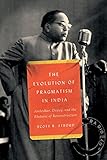The evolution of pragmatism in India : Ambedkar, Dewey, and the rhetoric of reconstruction / Scott R. Stroud.
Publisher: Chicago : The University of Chicago Press, [2023]Description: 302 pagesContent type:- text
- unmediated
- volume
- 9780226824321
- Ambedkar, Dewey, and the rhetoric of reconstruction
- 954.03 23/eng/20220616
- LAN015000 | PHI020000
| Item type | Current library | Shelving location | Call number | Status | Notes | Date due | Barcode |
|---|---|---|---|---|---|---|---|
 BOOKs
BOOKs
|
National Law School | General Stacks | 954.03 STR (Browse shelf(Opens below)) | Checked out | Recommended by Prof. Dr. Arun Thiruvengadam | 18.04.2024 | 39070 |
Includes bibliographical references and index.
Introduction : exploring the evolution of pragmatism in India -- Ambedkar and Dewey at Columbia University -- The genesis of Ambedkar's reconstructive rhetoric -- Reconstructive rhetoric, appropriation, and the strategic use of reference -- Pragmatism, reflection, and the annihilation of caste -- Education, force, and the will to convert -- Conclusion : the vision of Ambedkar's Navayana pragmatism.
"The story of how the Indian reformer Bhimrao Ambedkar reimagined John Dewey's pragmatism. In The Evolution of Pragmatism in India, Scott R. Stroud delivers a comprehensive exploration of the influence of John Dewey's pragmatism on Bhimrao Ambedkar, architect of the Republic of India's constitution. Stroud traces Ambedkar's development in Dewey's Columbia University classes in 1913-1916 through his final years in 1950s India when he rewrote the story of Buddhism. Stroud examines pragmatism's influence not only on the philosophical ideas underpinning Ambedkar's fight against caste oppression but also how his persuasive techniques drew on pragmatism's commitment to reconstruction and meliorism. At the same time, Stroud is careful to point out the ways that Ambedkar pushed back against Dewey's paradigm and developed his own approach to challenges in India. The result is a nuanced study of one of the most important figures in Indian history"-- Provided by publisher.

There are no comments on this title.